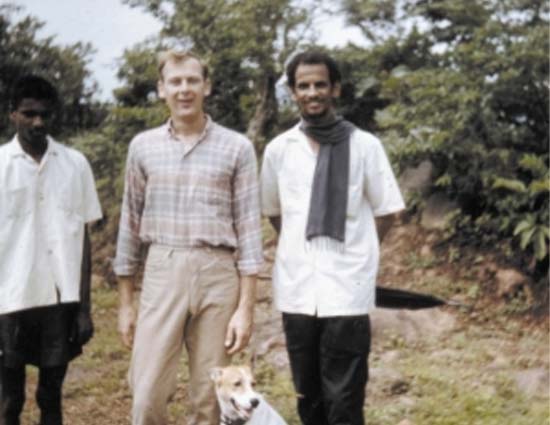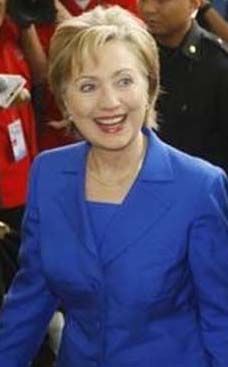
The majority of villagers were seeing white people, and most certainly Americans, for the first time. That we spoke their language, Marahti, was even more strange. Why were we there? What did we want? Were we spies? We would like to think that by the time we said our goodbyes, with some of the villagers kneeling to place their foreheads on our feet, we had not only earned their trust but, along with all our fellow Peace Corps volunteers, left an honorable and worthwhile impression of Americans.
Four decades later, Sharon and Scott Miller recall Peace Corps service in India
Four decades later, Sharon and Scott Miller recall Peace Corps service in India
Saturday, February 28, 2009 3:00 AM
Editor's note: This is the final story in a series marking National Peace Corps Week, Feb. 23-March 2. The writers, Sharon and Scott Miller of Salisbury, were a young married couple when they worked in the Rural Public Health Program in India in 1965-67.
By Sharon and Scott Miller
Special to the Salisbury Post
Recent tragic stories coming out of Bombay (Mumbai), India, stirred yet again vivid memories of our Peace Corps experience in that exotic and fascinating country.
Assigned to Maswan, a small, remote, rural village 60 miles north of Bombay, we lived and worked on a government health compound alongside a Dr. Varde, seeing the many villagers who walked the dusty miles to the daily clinic.
Culture shock set in quickly as, with no electricity or running water, we treated patients using glass syringes with barbed needles. When we admonished the helpers for not boiling them long enough and explaining the threat of cross contamination, they replied, "But Miller bai, we have only five needles and 30 patients needing shots, so what to do?"
Those who were admitted slept on metal beds with no sheets — an upgrade perhaps from the hard cow-dung floors at home. Family members came with them to prepare their meals, cooked over cow-patty fires.
Seeing a child's abdomen disfigured by ugly scars, the result of an attempt to "burn" the sickness out; examining a little boy and having his dried, opaque, sightless eyes almost collapse in my hands; administering anti-snake venom to no avail for a cobra snake bite to a little girl whose parents wasted precious time with the local medicine man; extracting huge tape worms; setting bones while dripping ether on a gauze over the nose; or performing mass vasectomies as part of India's birth control program became all part of a day's work.
One especially tragic day, villagers came to my door asking me to come with them to see a sick woman in her hut. Through the dimness, I saw the agony of a pregnant woman in labor. We brought her back to the center in an ox cart only to be sent away. The baby was breech and undeliverable. If she or the baby or both died, a stigma would be cast on the center, perhaps keeping others from coming, not to mention the stack of paperwork and government red tape.
Boxes of UNICEF powdered milk discovered in a storage room provided us opportunity to start a milk program at one of the schools, with hopes it might be a little help for bloated bellies. The program was for the children, but seeing half-naked little ones scamper away to their huts, giving the milk to their parents for their tea was discouraging.
In an effort to demonstrate that raising chickens and selling eggs could boost both nutrition and income, Scott created a model chicken farm, complete with 100 white leghorn layers from Bombay. The Hindus were skeptical about eating the eggs, even though we assured them they were not fertile because there was no rooster. They accused us of sneaking the rooster in at night, but they had to finally admit they never heard a rooster crowing.
Our clothes came back surprisingly clean after being beaten on the river rocks, albeit hard on the buttons.
Water taken from the deep, open community well — and carried in brass pots sometimes stacked three high on the heads of women — needed to be boiled for our drinking. This was especially true during monsoon, when the river would overflow into the well and cases of typhoid fever popped up.
The absence of utilities was a challenge, as were the periodic appearances of unwanted "varmints." One totally dark night, we awoke feeling something scurry across us, followed by Raja, our dog. A lit lantern revealed a mean, pointed-nosed rat (shrew) meeting his demise as our faithful mutt shook him to death.
Uncomfortable sleeping on the 2-inch-high ticked mattresses — which had to lay out in the sun during the day to kill the bed bugs — we decided to put them on top of each other and sleep on the floor. One night a rustling in the corner proved to be a long centipede called a gom that the villagers told us would crawl in your ear and eat your brain. Back to the beds!
Small scorpions that packed a big bite, bats, a couple of cobra snakes and a monkey encountered on a trip to a monkey-worshipping temple that bit Sharon in the leg, requiring booster shots, complete this topic.
The majority of villagers were seeing white people, and most certainly Americans, for the first time. That we spoke their language, Marahti, was even more strange. Why were we there? What did we want? Were we spies? We would like to think that by the time we said our goodbyes, with some of the villagers kneeling to place their foreheads on our feet, we had not only earned their trust but, along with all our fellow Peace Corps volunteers, left an honorable and worthwhile impression of Americans.
- - -
After returning to the United States, Scott received his master's degree in social studies and taught high school Afro-Asian studies in Corinth, N.Y., for 30 years. Sharon continued working as a nurse in medical/surgical, the emergency room and most recently as a school nurse.
The Millers retired to Salisbury in 2000. ("Love it here!") They have worked with Samaritan's Purse disaster relief after hurricanes Katrina and Ike on the Gulf Coast and will be going to New Orleans in April to help rebuild. Sharon is a counselor at the Pregnancy Support Center.












